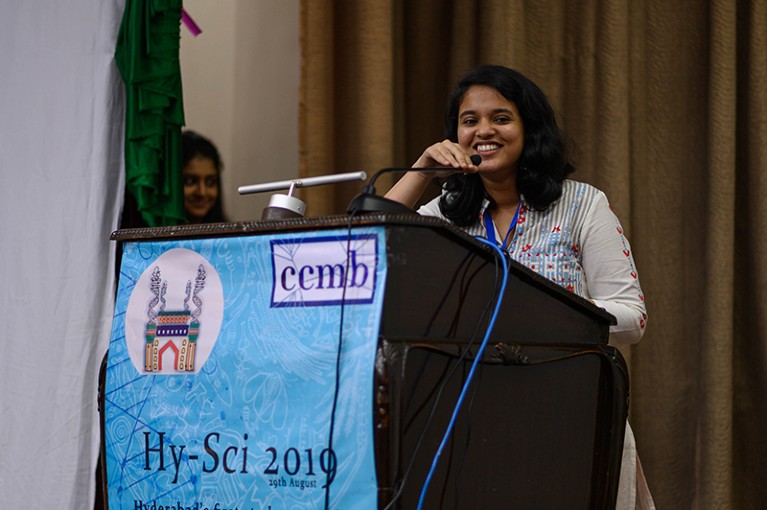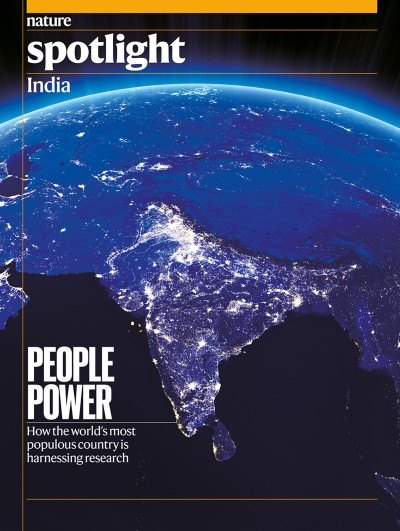
Annapoorna P. K. has called for greater awareness of mental-health issues in academia.Credit: Rahul Premkumar/CSIR-Centre for Cellular and Molecular Biology
Annapoorna P. K. works to understand the role of epigenetics in neuropsychiatric disorders such as depression, anxiety and addiction in mice as part of her PhD at the Centre for Cellular and Molecular Biology (CCMB) in Hyderabad. The ultimate goal of the work, P. K. says, is to have a better understanding of these disorders in humans. Alongside this work, she has documented a mental-health crisis among Indian academics and called for research institutes to create a space for conversation and action. Here, she tells Nature about her work on depression and her interests in mental-health advocacy and science communication.
Could you tell us about your PhD research?
My work is about understanding the role of epigenetics in depression. Epigenetics refers to the factors that affect gene expression without changing the sequence of DNA. There are proteins called histones that are attached to the DNA in all our cells. Chemical modifications to these histones can change how the DNA is expressed.
I work on histone demethylases, which are enzymes that remove the methyl groups that are attached to histones. A lot of studies say that histone demethylases have a direct role in stress susceptibility and depression, but the specifics are poorly understood.
To study this, I set out to generate a model of depression in mice. But depression is a multifactorial condition. It’s like diabetes: you can’t pinpoint one single gene or causal factor. So we studied stress in mice as a close correlate of depression. We put the mouse in close proximity to a bigger mouse of a different strain, inducing a situation similar to bullying. We then dissected the brains of the stressed mice to track the activity of a histone demethylase in the brain.
My latest results haven’t been published yet, but I can say we have found unequivocal evidence of a protein that is directly involved in depression in mice. We are working on uncovering its exact mechanism. I hope that future studies that look into depression in mice will consider the role of this protein.
Can you say how you got involved in mental-health advocacy and communication?
I expected academics to be more understanding of mental health and illness, especially those in my field. But even people working on the biology of the brain don’t truly comprehend mental health. That knowledge gap pushed me to take up advocacy.
In 2019, there was a huge pan-India survey curated by Shreya Ghosh and Debdutta Paul at IndiaBioscience, a science communication and outreach group based in Bengaluru. I had taken part in the survey and connected with Debdutta on Twitter. He then asked me if I would like to join their team and help them analyse the data. That analysis turned into a two-part article published in IndiaBioscience (see go.nature.com/46pzydj).
We were shocked by the number of people in academia who reported serious mental-health issues: it was around 40% of the 883 respondents. Those numbers seem to be broadly in line with other surveys of the academic community (see, for example, Nature 575, 403–406; 2019).
We also found that the efforts of most institutes to promote mental-health awareness, or to help their employees, were either minimal or non-existent. After our articles were published, we contacted institutes and department heads to get them to start a conversation. I was able to effect some change where I work, at the CCMB. I started the discussion through our student council and eventually communicated the need to our director. After that conversation, the institute employed a mental-health counsellor. The initial response to the counsellor was positive and quite a few individuals sought her services, including some faculty and staff members.
Apart from your institute, do you see any ripple effects from your report?
I’m sorry to say I haven’t seen anything significant. Even though the conversation is happening, and there are examples of some institutes making changes, other institutes and universities need to catch up.
It feels as if institutes are waiting for something very unfortunate to happen before they act. Even though awareness is growing, especially among the younger researchers, it is yet to penetrate the wall that exists between the administrators and the people who work on the ground. In short, we’re making a start but we have a long road ahead of us.


 India’s year in science
India’s year in science
 Where science meets Indian economics: in five charts
Where science meets Indian economics: in five charts
 Renewable energy for the subcontinent
Renewable energy for the subcontinent
 We need to talk about water
We need to talk about water
 The climate disaster strikes: what the data say
The climate disaster strikes: what the data say
 I predict solar storms
I predict solar storms
 The fight against antimicrobial resistance
The fight against antimicrobial resistance
 How high-impact papers from Indian researchers are shaping science
How high-impact papers from Indian researchers are shaping science
 India struggles to turn science into societal benefits
India struggles to turn science into societal benefits
 Big ideas: India’s drive to stem the brain drain
Big ideas: India’s drive to stem the brain drain






